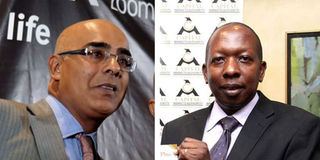Spirited campaign to tighten rules for online forex traders

Mr Ally Khan Sachu (left) and Mr Luke Ombara. FILE PHOTO | NMG
What you need to know:
- The draft outlaws cash transactions between customers and online forex traders in favour of independent bank accounts, and bars opening of direct forex accounts abroad for individual or Kenyan companies in favour of ledger accounts held by licensed forex traders.
- While in the past many Kenyans have operated forex accounts secretly, the new draft bans cash dealings between a dealer and a customer in favour of bank deposits. It says all commissions to be paid to a customer must be made via cheques and via electronic funds transfer.
- It remains to be seen how the country intends to govern online trade since most forex traders are foreign entities who advertise their businesses on online platforms frequented by Kenyans.
The unregulated online forex business where about 80,000 Kenyans operate could end soon if a new legislation drafted by the Capital Markets Authority’s (CMA) becomes law later in the year.
The draft outlaws cash transactions between customers and online forex traders in favour of independent bank accounts, and bars opening of direct forex accounts abroad for individual or Kenyan companies in favour of ledger accounts held by licensed forex traders.
While this increases CMA’s ability to monitor the movement of money in and out of Kenya through cashless platforms, the proposed law also says only licensed companies should be able to trade on forex counters abroad.
In a major slap on forex trading for small traders, the draft calls for a Sh50 million minimum capital limit and adds that dealers must locally hold Sh40 million or 80 per cent of their capital reserves in financial instruments at all times.
“For foreign-based online brokers, they must provide an undertaking that they shall locate the prescribed capital to support their activities in Kenya,” it says.
In an interview, CMA’s regulatory policy and strategy director Luke Ombara said the new law would enable Kenya to not only licence the dealers but get information on all financial activities to safeguard Kenyans’ hard earned cash.
“We shall be able to get quarterly, bi-annual and annual reports on all forex activities that have for long remained unregulated. We now have a sizeable number of players, at about 80,000 individuals, but the forex dealers have remained in the shadows,” said Mr Ombara.
Financial analyst Ally Khan Sachu supported CMA’s interest in the matter but added that Kenya needs to create similar platforms locally before attempting to regulate the activities of foreigners.
“If we wish to regulate, we need to create platforms that are commensurate with international platforms,” he said.
Currently, the government has no clue on how much money is involved in online forex business which is rapidly expanding, raising fears of money laundering.
If enacted, all forex dealers must register with CMA, providing proof of their academic background and knowledge on forex trading as well as be subjected to a global integrity check to ensure compliance with the regulations.
“A shareholder, director and all key personnel of the applicant shall be persons who have not defaulted in payment of dues at any securities exchange, clearing house, central bank or any bank,” says the draft.
Mr Ombara said all forex traders shall be deemed qualified where they have legitimate licences from the foreign forex markets they operate in and that the Kenyan licence automatically stands revoked if the dealer loses their forex licence.
Mr Khan, who heads financial advisory firm Rich Management described online forex trading as a great opportunity but added that Kenya needs to examine the reasons that are making many Kenyans engage in foreign cash trading activities.
“We need to make a business case for the 80,000 Kenyans so as to lure them to return their money home or else risk losing more people as they lose confidence with the existing money markets and head abroad,” he said.
While in the past many Kenyans have operated forex accounts secretly, the new draft bans cash dealings between a dealer and a customer in favour of bank deposits. It says all commissions to be paid to a customer must be made via cheques and via electronic funds transfer.
Currently, all dealings are in US dollars and none is in Kenya shillings. About 80 per cent of the dealers conduct forex transactions in UK, Australia and Mauritius markets.
It adds that customer funds must be segregated from forex dealer’s personal accounts and that each dealer must employ a qualified compliance officer who shall report directly to CMA on all dealings and be held accountable in case of failure to report an anomaly.
While many forex dealers operate without inspection from the authorities, the new draft creates inspectors’ offices and gives them powers to conduct impromptu checks on any trader, forex director employee or company.
It remains to be seen how the country intends to govern online trade since most forex traders are foreign entities who advertise their businesses on online platforms frequented by Kenyans.
Mr Khan urged for caution in the planned draft, saying Kenyans need to be encouraged to trade as many of them had developed much-needed skills to make money online.




